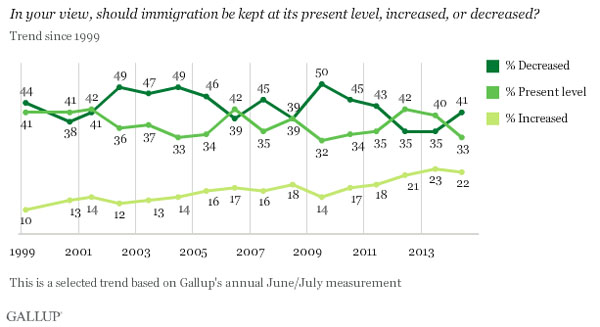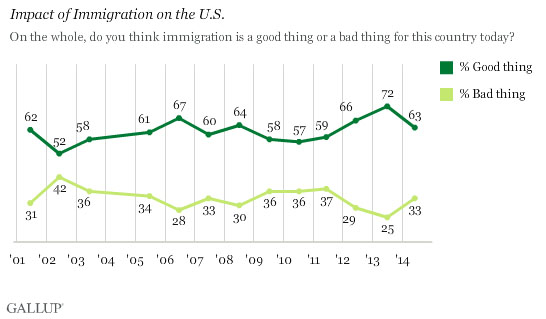More in U.S. Would Decrease Immigration Than Increase
Lydia Saad, Gallup, June 27, 2014
While illegal immigration typically dominates debates over immigration policy, the issue of legal immigration came to the forefront in the recent Virginia Republican primary when House Majority Leader Eric Cantor was soundly defeated by Tea Party favorite Dave Brat. Brat highlighted Cantor’s support for expanding visas for skilled immigrants in his blistering charge that Cantor is soft on immigration. Brat’s case may have been a fairly easy one to make, as new Gallup polling finds fewer than one in four Americans favor increased immigration.
The small amount of Americans who favor increased immigration include just 14% of Republicans. In fact, more Americans think immigration should be decreased than increased, and by a nearly two-to-one margin, 41% vs. 22%. A third in the U.S. are satisfied with the level as it is.
Americans’ views on immigration have varied a bit in the past 15 years, with the dominant view shifting between decreasing immigration and maintaining it at the current level. Some of these changes may reflect the ebb and flow of Americans’ reactions to the 9/11 attacks in 2001 as well as rocketing unemployment in 2009, with both events triggering a temporary surge in anti-immigration sentiment.
However, the Gallup trend also chronicles a separate narrative: a steady increase in public support for increasing immigration, rising from 10% in 1999 to 21% in 2012 and 22% today.
The long-term rise in support for expanding immigration could reflect growing public sympathy for the argument made by some prominent business leaders that the current cap on the number of work visas granted to highly skilled foreign nationals each year–the so called H-1B visa program–needs to be raised. In 2013, Gallup found about three-quarters of Americans were in favor of expanding the number of short-term work visas for highly skilled workers as part of a comprehensive immigration reform package.
{snip}
Since 2000, support for increased immigration rose 13 percentage points–from 17% to 30%–among adults with a postgraduate education, and it rose 19 points among those who stopped at an undergraduate degree. It grew comparatively less among those with only some college education (eight points) as well as those with no more than a high school education (four points).
Despite Americans’ resistance to increasing immigration, the great majority continue to view immigration in positive terms for the country, with 63% calling it a good thing. That is down from 2013’s high of 72%, but still exceeding the sub-60% readings found during the recent recession and, before that, in the wake of 9/11.
This upbeat view of immigration is held by 72% of Democrats, 63% of independents, and 55% of Republicans.
{snip}

















